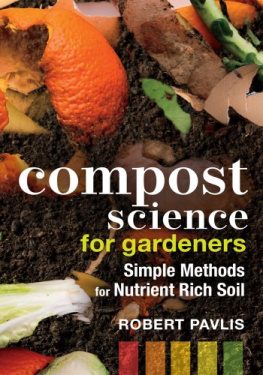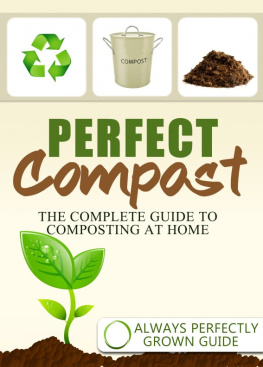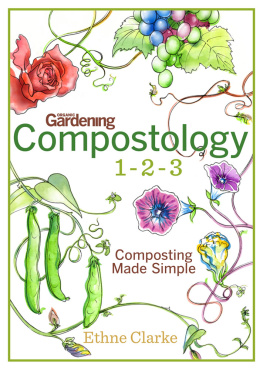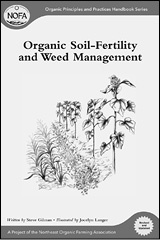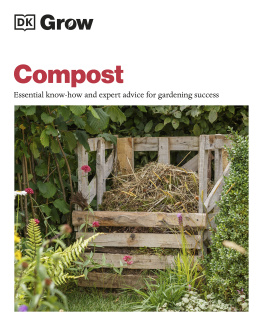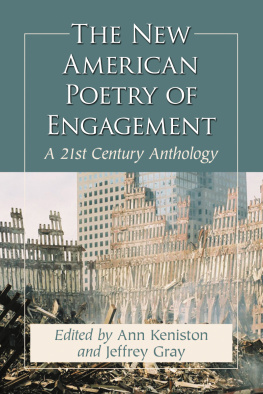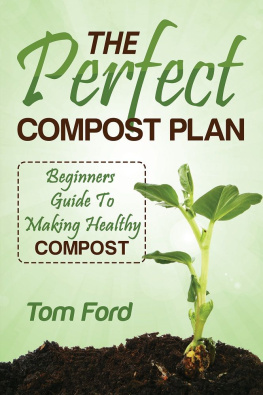Rasula - This compost ecological imperatives in American poetry
Here you can read online Rasula - This compost ecological imperatives in American poetry full text of the book (entire story) in english for free. Download pdf and epub, get meaning, cover and reviews about this ebook. City: Athens, year: 2002;2012, publisher: University of Georgia Press, genre: Art. Description of the work, (preface) as well as reviews are available. Best literature library LitArk.com created for fans of good reading and offers a wide selection of genres:
Romance novel
Science fiction
Adventure
Detective
Science
History
Home and family
Prose
Art
Politics
Computer
Non-fiction
Religion
Business
Children
Humor
Choose a favorite category and find really read worthwhile books. Enjoy immersion in the world of imagination, feel the emotions of the characters or learn something new for yourself, make an fascinating discovery.

This compost ecological imperatives in American poetry: summary, description and annotation
We offer to read an annotation, description, summary or preface (depends on what the author of the book "This compost ecological imperatives in American poetry" wrote himself). If you haven't found the necessary information about the book — write in the comments, we will try to find it.
Rasula: author's other books
Who wrote This compost ecological imperatives in American poetry? Find out the surname, the name of the author of the book and a list of all author's works by series.
This compost ecological imperatives in American poetry — read online for free the complete book (whole text) full work
Below is the text of the book, divided by pages. System saving the place of the last page read, allows you to conveniently read the book "This compost ecological imperatives in American poetry" online for free, without having to search again every time where you left off. Put a bookmark, and you can go to the page where you finished reading at any time.
Font size:
Interval:
Bookmark:
This Compost
ECOLOGICAL IMPERATIVES
IN AMERICAN POETRY
Jed Rasula

Paperback edition, 2012
2002 by the University of Georgia Press
Athens, Georgia 30602
www.ugapress.org
All rights reserved
Designed by Betty Palmer McDaniel
Set in 10 on 14 Janson MT by BookComp
Printed digitally in the United States of America
The Library of Congress has cataloged the
hardcover edition of this book as follows:
Rasula, Jed.
This compost : ecological imperatives in American poetry / Jed Rasula.
xv, 259 p. : ill. ; 25 cm.
Includes bibliographical references (p. 223236) and index.
ISBN 0-8203-2366-7 (hardcover : alk. paper)
1. American poetryHistory and criticism. 2. Nature in
literature. 3. Environmental protection in literature. 4. Nature
conservation in literature. 5. Ecology in literature. I. Title.
PS310.N3 R37 2002
811.009355dc21 2002000856
Paperback ISBN-13: 978-0-8203-4419-5
ISBN-10: 0-8203-4419-2
British Library Cataloging-in-Publication Data available
ISBN for this digital edition: 978-0-8203-4480-5
IN MEMORY OF MENTORS
Mike Erwin
Harvey Brown
Mark Ruddick
Of course the old questions, why are we here?,
why do we exist in the flask of visible circumstance?
Only to have the animal stolen from us?,
only to have our most intimate fervour destroyed?
WILL ALEXANDER, Towards the Primeval Lightning Field
for a meniscus tension of exhumation swells the page
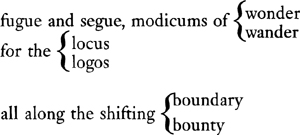
RACHEL BLAU DUPLESSIS, Drafts
One being climbs up inside another for the revolution in art.
JOANNE KYGER, Just Space
This Compost combines several functions in one. It is an anthology of sorts, concentrating on the Black Mountain lineage in modern American poetry, though with plenty of related extracts going back to Whitman and Dickinson. But anthologies invariably reflect judgments of taste, and This Compost neither argues the priority of, nor attempts to canonize, a particular set of poets. Insofar as I take poetry to be something more than the exercise of aesthetic self-expression, there are tacit limits to the poets included here. Robert Creeley reports Allen Ginsberg urging, You dont really have to worry about writing a good poem any more, you can write what you want to (Faas, 187). While Creeley overestimates will, the peculiar energy I find in the poets in This Compost is their willingness to work outside prevailing literary sensibility. Often the very look of the poems discloses a sculptural address, or a kinetic choreography attentive to organism, not decorum. As a compendium of extracts, this book does not validate aesthetic claims commonly made in literary criticism so much as document a stance toward the living planet, a stance these poets share with many people who know nothing of poetry.
Despite its length, This Compost is also an essay. There are no chapters as such; rather, the headings indicate topoi in the old rhetorical sense : sites of excavation and deliberation. While they are arranged to be read chronologically, the method is somewhat circular, so the reader will find certain topoi recurring in a seasonal rotation. Footnotes appear at the bottom of the page because I write that way; I favor a bifocal prospect, atavistic residue perhaps of hunting and tracking instincts. Ed Sanders says A footnote is a dangling data-cluster and compares it to a mobile by Alexander Calder. I like the quadruped diagram Sanders provides (The Art of the Elegant Footnote, in Thirsting for Peace in a Raging Century, 162).
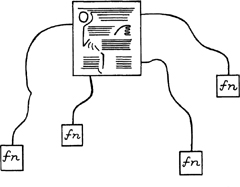
As an exercise in ecological solidarity with the materials it conveys, This Compost practices what it preaches in that most of the citations of poetry are not identified in the text, but blended into polyphonic configurations. Sometimes what is given as a single poetic citation is assembled from several poets or poemsalthough different extracts are always indicated by a marker (~) at the right-hand margin. All sources from books of poetry are clearly identified at the end of the book, in the citations chapter (pp. 2012). Quoted prose, on the other hand, is identified parenthetically in the text. (Citation from prose poems complicates matters; but if no reference is given in the text, you can bet its a prose poem referenced in the citations chapter.) I have taken the liberty of not citing pre-twentieth-century work by page number, since there are so many editions. But the originalsfrom Emersons prose, Whitmans poetry, or early modern authors like Thomas Brownetend to be concise or conveniently divided. So extracts from Whitman are identified by section numbers (in the numbering of Whitmans final deathbed edition), and in the case of prose writers I provide chapter or section indicators.
The origins of my citational practice are also the origins of This Compost in that I initially noticed thematic congruencies specific to some primary books published in 1960The Distances by Charles Olson and The Opening of the Field by Robert Duncanwhich led to comparisons with work by Jack Spicer and Louis Zukofsky, among others. The notion of composition by field carried obvious implications of compost, which led me to the concept of necropoetics developed here by way of Whitman. The notion of a compost library arose when I began carefully placing certain extracts side by side without authorial distinction. Its worth recalling that this tactic was also indebted to those influential if too easily misconstrued essays by Roland Barthes (The Death of the Author) and Michel Foucault (What Is an Author?), along with the notion of intertextuality developed by Julia Kristeva and Barthes.to collaboration; authorship, in turn, extended far beyond specific acts of writing.
The bibliography includes titles cited or mentioned in the text. Additional titles appear in the biographical glossary, which consists of thumbnail sketches of the poets most prominent in This Compost. The resources used here vary considerably, having much to do with the span of time during which This Compost was written. At the outset, in 1980, there were no standard editions of most of the work I deal with hereand some of it was still appearing in little magazinesbut in the intervening decades they have proliferated (University of California Press doing the lions share, issuing The Maximus Poems, A, Creeleys Collected Poems, and numerous other titles by Olson, Zukofsky, and Creeley). I have been able to make use of these and some other definitive collections (like those of Robinson Jeffers [Stanford] and William Carlos Williams [New Directions]), but it proved too much to keep adapting to all the reissues and new editions as they appeared. So, as much as I appreciate the editorial labors of Ben Friedlander and Donald Allen, I have not cited from their edition of Olsons Collected Prose (which, in any case, omits many texts central to This Compost); nor have I gone beyond the 1972 edition of Pounds
Next pageFont size:
Interval:
Bookmark:
Similar books «This compost ecological imperatives in American poetry»
Look at similar books to This compost ecological imperatives in American poetry. We have selected literature similar in name and meaning in the hope of providing readers with more options to find new, interesting, not yet read works.
Discussion, reviews of the book This compost ecological imperatives in American poetry and just readers' own opinions. Leave your comments, write what you think about the work, its meaning or the main characters. Specify what exactly you liked and what you didn't like, and why you think so.

